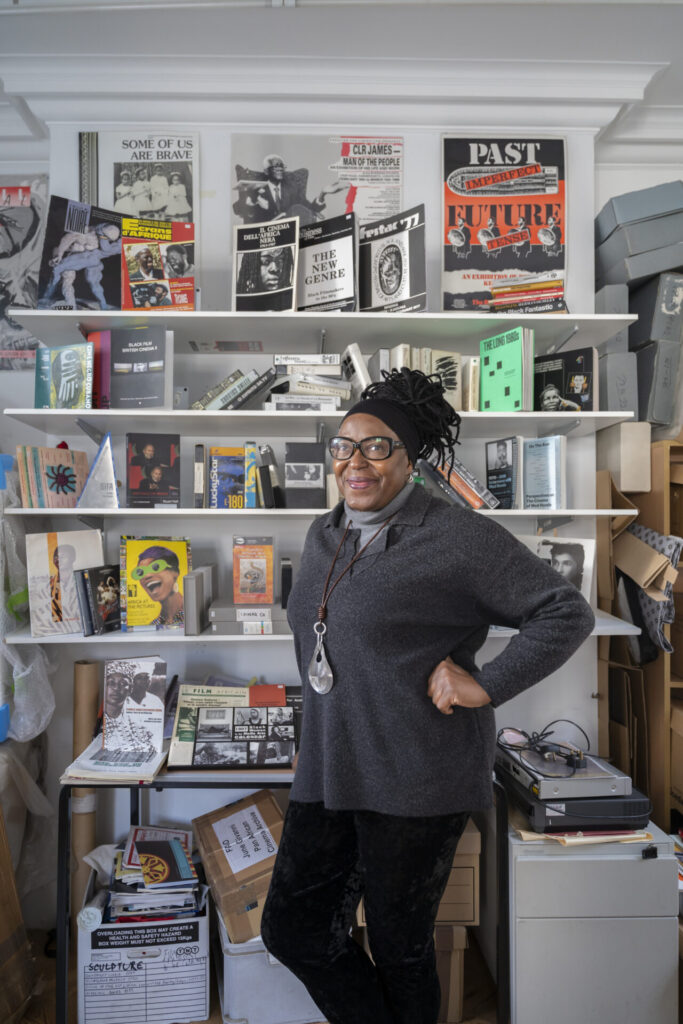THE STORY OF JGPACA
CURATING AND PROMOTING AFRICAN & AFRICAN DIASPORA CINEMA AND CULTURE
Dr June Givanni is a pioneering international film curator who has considerable experience in film and broadcasting for over 30 years and she is regarded as a resource for African and African diaspora cinema.
The development of the Pan African Cinema Archive is based on her collections from years of working in the field of cinema. Her motivation for the archive is to make this valuable heritage collection as widely accessible as possible.
In the early 1980s she was involved in bringing Third Eye London’s first Festival of Third World Cinema, to London and she worked as a film programmer at the Greater London Council’s Ethnic Minorities Unit, at a key development stage for Black British Independent cinema, and Black British art and culture generally.
June ran the African Caribbean Film Unit and edited the quarterly Black Film Bulletin; and the book Symbolic Narratives: Africa Cinema at the British Film Institute. She also programmed Planet Africa at The Toronto International Film Festival over 4 years. She has worked as a film curator with festivals on 5 continents – including India – and has been involved in key moments in the development of Pan African cinema on these continents, and the development of the links between them.
June has worked closely with many of the key filmmakers, critics and theorists involved with ‘Black British Cinema’; ‘African Cinema’; ‘Third Cinema’; ‘Caribbean Cinema’; Black Cinema from Europe; and African American Independent Cinema.

JGPACA DIRECTORS
PATRONS
CCH Pounder
 Actress CCH Pounder’s collection contains over 500 works of art from the Caribbean and African Diaspora. Originally from Georgetown Guyana Pounder and her husband, the late Boubacar Koné, built the Musée Boribana in 1992, the first privately owned contemporary museum located in Senegal, which they gifted to that nation in 2014. Pounder has loaned numerous pieces to institutions including Xavier University, Kent State and also for exhibits at Somerset House in England and The Charles H. Wright Museum of African American History in Detroit, MI.
Actress CCH Pounder’s collection contains over 500 works of art from the Caribbean and African Diaspora. Originally from Georgetown Guyana Pounder and her husband, the late Boubacar Koné, built the Musée Boribana in 1992, the first privately owned contemporary museum located in Senegal, which they gifted to that nation in 2014. Pounder has loaned numerous pieces to institutions including Xavier University, Kent State and also for exhibits at Somerset House in England and The Charles H. Wright Museum of African American History in Detroit, MI.
Pounder serves on the Advisory Board of the African Millennium Foundation and was a founding member of Artists for a New South Africa. Recent accolades include the Visionary Leadership Award from MOAD in San Francisco; the Sweet Arts Award from the Contemporary Arts Center in New Orleans, the National Urban League’s 2017 Women of Power Award
Euzhan Palcy

Euzhan Palcy is a writer, director and producer born in Martinique in the French West Indies. Her first feature film, “Sugar Cane Alley,” won the Silver Lion at the 1983 Venice Film Festival, a first for a Black director. It went on to win a César Award (French Oscar) for Best First Work, the first César won by a woman director and by a Black filmmaker. She continued her journey with “A Dry White Season” in 1989, a drama made at the height of apartheid, becoming the first Black woman to direct a film for a major Hollywood studio and guiding Marlon Brando to his last Oscar nomination.
Her films also include the musical fairytale “Siméon.” Palcy’s work has been an inspiration to filmmakers, contemporary artists and novelists. Recently she was awarded with the prestigious Medal of Honor from the Society of Dramatic Arts and Composers in France as well as the Medal of Honor from the French National Assembly. In Los Angeles, in November 2022, the Governors of the Academy of Motion Pictures, Arts and Science rewarded her with an Honorary Oscar for her groundbreaking significance in international cinema.
Gaston Kabore
 Gaston Jean-Marie KABORE was born on April 23rd, 1951. Film Director, writer and producer in one, Gaston Kaboré is an outstanding figure in the film world of his home country, Burkina Faso and in African continent. He has directed more than twenty films of cinema and television, including in particular four feature-length films cinema which met remarkable success both on national and international scale. His first fiction film “WEND KUUNI” (1982) has been well received in the whole world, obtaining a large number of awards and prizes and in particular the César award in France in march 1985; his last feature-length film entitled “BUUD YAM” (1997) received the stallion of Yennenga Grand Prix of the Festival of Ouagadougou in 1997 and was selected the same year by “the Directors’ fortnight” at the International film festival of Cannes. He was member of the official juries of the greatest international festivals of cinema in the world : Locarno (1989), Venice (1994), Cannes (1995), Berlin (2009), FESPACO (2009).
Gaston Jean-Marie KABORE was born on April 23rd, 1951. Film Director, writer and producer in one, Gaston Kaboré is an outstanding figure in the film world of his home country, Burkina Faso and in African continent. He has directed more than twenty films of cinema and television, including in particular four feature-length films cinema which met remarkable success both on national and international scale. His first fiction film “WEND KUUNI” (1982) has been well received in the whole world, obtaining a large number of awards and prizes and in particular the César award in France in march 1985; his last feature-length film entitled “BUUD YAM” (1997) received the stallion of Yennenga Grand Prix of the Festival of Ouagadougou in 1997 and was selected the same year by “the Directors’ fortnight” at the International film festival of Cannes. He was member of the official juries of the greatest international festivals of cinema in the world : Locarno (1989), Venice (1994), Cannes (1995), Berlin (2009), FESPACO (2009).
Parallel to his career of filmmaker, Gaston J-M KABORE has ran several national and international institutions including the National film board of Burkina Faso (1977 - 1988) and the Panafrican Federation of filmmakers (FEPACI, 1985-1997). In addition he has cofounded in 1991 “SCREENS Of AFRICA”, a bilingual magazine (French /English) on African cinema of which he was the publishing manager till 1998.
Initiator and editing director of the book publication “Africa and the Centenary of Cinema” published by FEPACI/Présence Africaine Editions in 1995, Gaston JM Kaboré never stopped organizing professional training sessions in Africa (from Senegal to South Africa). In February 2003, it founded “IMAGINE”, a training institute willing to up grade the skills of African professionals working in the fields of cinema and television ; more than 1 758 professionals have been trained at IMAGINE so far.
Apart from the scripts of his own films Gaston J-M KABORE has co-written the scripts of several fiction films and animated movies. In 2008, he signs his first novel “IL PRINCIPLE DELLA CITTA DI SABBIA” co-written with two Italian writers, Pierdomenico Baccalario and Enzo D’Alo “.
John Akomfrah

John Akomfrah is a hugely respected artist and filmmaker, whose works are characterised by their investigations into memory, post-colonialism, temporality and aesthetics and often explore the experiences of migrant diasporas globally. Akomfrah was a founding member of the influential Black Audio Film Collective, which started in London in 1982 alongside artists David Lawson and Lina Gopaul, who he still collaborates with today.
Akomfrah’s recent solo exhibitions include Hirshhorn Museum and Sculpture Garden, Washington D.C., USA (2022); Midlands Art Centre, Birmingham, UK (2022); E-WERK, Freiburg, Germany (2022); Remai Modern, Saskatoon, Canada (2022); Towner Eastbourne, Eastbourne, UK (2021); Fundació Antoni Tàpies, Barcelona, Spain (2021); Centro Andaluz de Arte Contemporáneo, Sevilla, Spain (2020); Seattle Art Museum, Seattle, WA, USA (2020) and Secession, Vienna, Austria (2020.
His participation in international group exhibitions includes: ‘Sharjah Biennial 15: Thinking Historically in the Present', Sharjah, United Arab Emirates (2023); ‘Global Ghana’, The Africa Institute, Sharjah, UAE and Accra, Ghana (2022); 'Fault Lines', North Carolina Museum of Art, Raleigh, USA (2022); ‘Posteriority’, Museum of Contemporary Art Busan, Busan, South Korea (2021); ‘Family – Visions of a shared humanity’, Art Gallery of New South Wales, Sydney, Australia (2021); ‘Am I Human To You?’, Art Museum KUBE, Alesund, Norway (2021); ‘Affect Machine: Self-healing in the Post-Capitalist Era’, Taipaei Fine Arts Museum, Taipei, Taiwan (2021); ‘Terminal’, City Gallery, Wellington, New Zealand (2020) and Ghana Pavilion, 58th Venice Biennale, Venice, Italy (2019).
He was awarded the Artes Mundi Prize in 2017. He was awarded a Knighthood for services to the Arts in the 2023 New Year Honours, and has been selected to represent the UK at the Venice Biennale in 2024.
Raoul Peck

Award-winning director Raoul Peck has produced an extensive range of work including documentaries, feature films, and television series, which tell stories that address social and political issues such as colonialism, racism, and social injustice. From 1994 to 1995, Raoul Peck taught film at the NYU Tisch School. He became Minister of Culture of the Republic of Haiti until 1997. In 2010 he was appointed President of the French national film school la Fémis until 2019.
Peck's body of work includes the Oscar nominated and multi-award-winning documentary I Am Not Your Negro, the groundbreaking Peabody Award-winning HBO series Exterminate All The Brutes, Lumumba, Death of a Prophet and Fatal Assistance, as well as narrative films Sometimes in April (HBO), a reality driven political film about the genocide in Rwanda; The Young Karl Marx, a political drama about three young European who one day decided to change the world; Moloch Tropical, a fictional pamphlet is about the end of democracy, and Profit and Nothing But, a 2000 documentary about globalisation.







